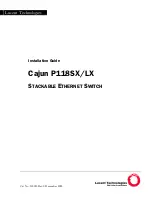
66
A
PPENDIX
A: S
PECIFICATIONS
Network
Connection Criteria
The following table provides network connection criteria for the 3CR990 NICs.
Network Cable
This section provides information about various network cable standards and
descriptions of those standards for EtherLink 10/100 PCI NICs.
Cabling Requirements
The cable type, quality, distance, and connectors must comply with the
Electronic Industries Association/Telecommunications Industries Association
(EIA/TIA) 568
Commercial Building Wiring Standard
and the Technical Services
Bulletin TSB38 standards.
Twisted-Pair Cable
Twisted-pair cable consists of copper wires surrounded by an insulator. Two wires
are twisted together (the twisting prevents interference problems) to form a pair,
and the pair forms a circuit that can transmit data. A cable is a bundle of one or
more twisted pairs surrounded by an insulator.
Unshielded twisted pair (UTP) is the most commonly used type of twisted-pair
cable. Shielded twisted pair (STP) provides protection against crosstalk.
Twisted-pair cable is now commonly used in Ethernet, Fast Ethernet, and
other network topologies.
Unshielded Twisted-Pair
Cable Categories
The following table shows the five categories of unshielded twisted-pair cable as
defined by the EIA/TIA.
10BASE-T Description
10BASE-T is the Institute of Electrical and Electronics Engineers (IEEE) 802.3
standard for Ethernet signaling over unshielded twisted-pair wire at 10Mbps.
Ethernet, as the most widely used network protocol, uses 10BASE-T as its primary
cabling scheme. Ethernet characteristics include:
■
A data rate of 10 Mbps
■
A broadcast architecture
■
A specific media-access control (MAC) scheme
NIC
Cable
Network Cable
Connector
Transceiver
Maximum
Network Segment
Speed
Media Type
3CR990-TX-9X
Category 3, 4, or 5
unshielded twisted-pair
RJ-45
On-board
328 ft/100 m
10/100
Mbps
10BASE-T
100BASE-TX
Category
Use
1
Traditional telephone cable.
2
Data transmissions up to 4 MHz.
3
Voice and data transmission up to 25 MHz. The cable typically has four pairs
of wires. Category 3 is the most common type of installed cable found in
older corporate wiring schemes.
4
Voice and data transmission up to 33 MHz. The cable normally has four pairs
of wire. This grade of UTP is not common.
5
Voice and data transmission up to 125 MHz. The cable normally has four pairs
of copper wire and three twists per foot. Category 5 UTP is the most popular
cable used in new installations.
Summary of Contents for EtherLink 10
Page 8: ......
Page 22: ...22 CHAPTER 3 NIC INSTALLATION PCI 2...
Page 23: ...Installing the NIC 23 3 Remote Wake Up Cable 3A 2 1 PCI specifications compliant...
Page 24: ...24 CHAPTER 3 NIC INSTALLATION 4 TX DATA ACT 10 100 L N K 5...
Page 26: ......
Page 38: ......
Page 74: ......
Page 84: ......
















































